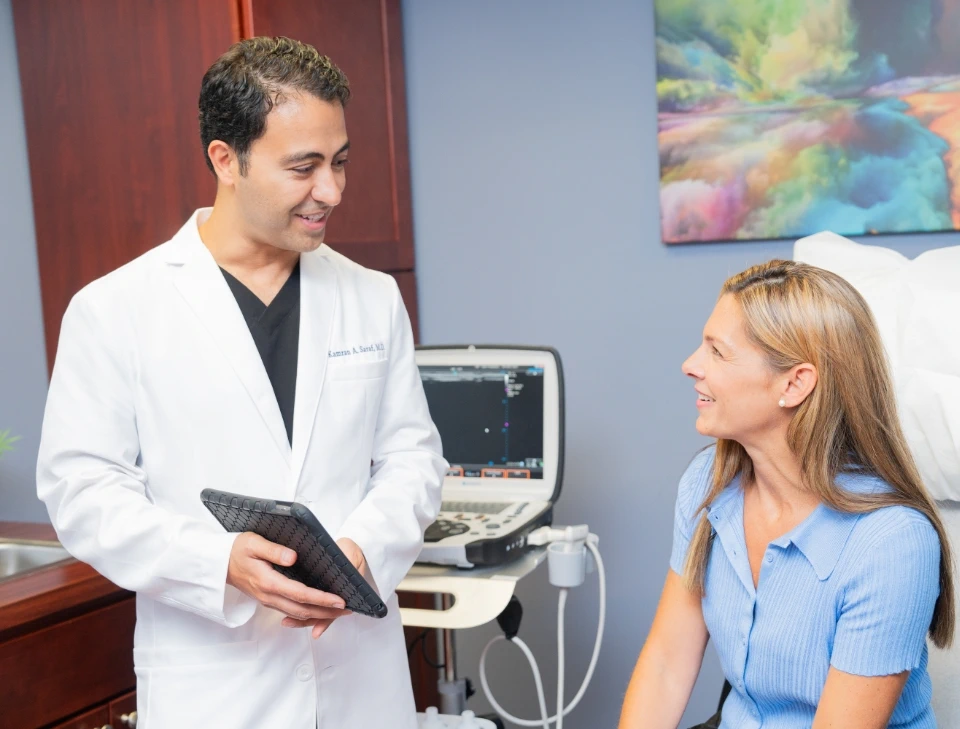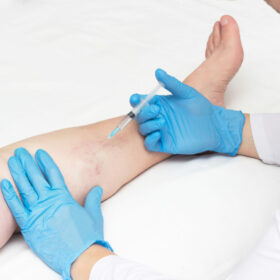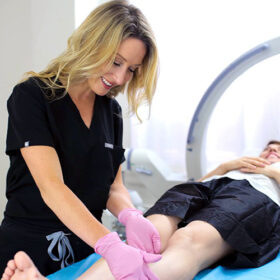If you suffer from varicose veins, you may be wondering if surgery is the right treatment option for you. While surgery is a traditional method for treating varicose veins, it is not without risks. In this article, we will discuss the potential risks of varicose vein surgery and suggest alternative treatments that may be safer and more effective.
What Are Varicose Veins?
Varicose veins are a common condition that affects many people. They can be described as veins that have become enlarged, twisted, and bulging, causing them to appear blue or purple in color. Varicose veins usually develop in the legs, but they can also occur in other parts of the body. Varicose veins are more common in women than men and are often hereditary. Other risk factors for varicose veins include obesity, pregnancy, long periods of standing or sitting, and a lack of physical activity.
The primary cause of varicose veins is weakened or damaged valves in the veins. The veins in our legs are responsible for carrying blood back to the heart, and they have small valves that prevent blood from flowing backward. If these valves become damaged, they may not function properly, causing blood to flow back down the vein and pool, resulting in bulging veins. Common symptoms include aching, throbbing, and a heavy sensation in the legs. Varicose veins can also increase the risk of other complications, such as leg ulcers and deep vein thrombosis.
What Are The Effects of Varicose Veins?
Varicose veins can cause significant discomfort and pain that can affect a person’s daily activities and quality of life. The pain and discomfort associated with varicose veins can be described as a throbbing or aching sensation in the legs, especially after prolonged periods of standing or sitting. This discomfort may be accompanied by a feeling of heaviness or tiredness in the legs, which can make it difficult to move around or engage in physical activity.
In addition to discomfort, varicose veins can also lead to skin changes, such as discoloration and ulcers. Over time, the skin around the affected veins may become discolored and dark, a condition known as hyperpigmentation. This discoloration is caused by the buildup of blood and other fluids in the area, which can cause the skin to become inflamed and irritated.
If left untreated, the skin around the affected veins may become thinner and more fragile, increasing the risk of injury and infection. This can lead to the development of venous ulcers, which are open sores that occur on the skin’s surface. Venous ulcers can be difficult to heal and can cause significant pain and discomfort, often requiring specialized treatment to resolve.
Varicose veins can also increase the risk of blood clots, a condition known as deep vein thrombosis (DVT). DVT occurs when a blood clot forms in a deep vein, usually in the leg. If the blood clot breaks loose and travels to the lungs, it can cause a pulmonary embolism, which can be life-threatening. Because of these complications, it is essential to seek treatment for varicose veins to improve your health.
What is Varicose Vein Surgery?
Varicose vein surgery is a traditional treatment method that involves the removal of the affected veins. The surgery is typically performed under general anesthesia, meaning the patient is completely unconscious during the procedure. During the surgery, a small incision is made near the affected vein, and the vein is removed using a technique called vein stripping.
How Risky is Varicose Veins Surgery?
Like any surgery, varicose vein surgery comes with risks. Some of the potential risks of varicose vein surgery include:
- General anesthesia complications: General anesthesia can cause complications such as allergic reactions, respiratory problems, and heart problems. These complications are rare, but they can be serious.
- Bleeding: Varicose vein surgery can cause bleeding, both during and after the procedure. If bleeding is severe, it may require further treatment or surgery.
- Infection: Surgery always carries a risk of infection. Infection can occur at the site of the incision and can be treated with antibiotics.
- Nerve damage: Varicose vein surgery can damage nerves in the affected area, leading to numbness, tingling, or pain. In rare cases, nerve damage can be permanent.
- Recurrence: Varicose veins can recur after surgery, especially if the underlying cause of the veins is not addressed.
- Recovery time: Recovery from varicose vein surgery can take several weeks or even months. During this time, the patient may experience pain, swelling, and limited mobility.
What are the Alternatives to Varicose Vein Surgery?
Fortunately, there are alternative treatments to varicose vein surgery that are less invasive and carry fewer risks. At Vein Treatment Clinic, we offer a range of minimally invasive treatments for varicose veins, including:
- Endovenous laser ablation: This treatment uses laser energy to close the affected vein. The procedure is performed using local anesthesia, and the patient can usually return to normal activities immediately after the treatment.
- Radiofrequency ablation: This treatment uses radiofrequency energy to close the affected vein. Like endovenous laser ablation, the procedure is performed using local anesthesia, and the patient can usually return to normal activities immediately after the treatment.
- VenaSeal: This treatment uses a medical adhesive to close the affected vein. The procedure is performed using local anesthesia, and the patient can usually return to normal activities immediately after the treatment.
- ClariVein: This treatment uses a small catheter to deliver a chemical solution to the affected vein. The catheter is rotated, creating a mechanical and chemical reaction that closes the vein. Like other minimally invasive treatments, the procedure is performed using local anesthesia, and the patient can return to normal activities immediately.
- Sclerotherapy: This treatment involves injecting a chemical solution into the affected vein, causing it to close. The procedure is performed using a very fine needle and local anesthesia, and the patient can usually return to normal activities immediately after the treatment.
- Ambulatory phlebectomy: This treatment involves removing the affected vein through a small incision. Unlike traditional vein stripping surgery, ambulatory phlebectomy is minimally invasive and does not require general anesthesia.
All of these minimally invasive treatments are performed on an outpatient basis, meaning the patient can usually return home on the same day as the procedure. They also carry fewer risks than traditional vein stripping surgery and have shorter recovery times. In addition, these treatments can address the underlying cause of varicose veins, reducing the risk of recurrence.
Wear Compression Stockings
If you have mild varicose veins or are waiting for treatment, wearing compression stockings can help reduce symptoms and prevent complications. Compression stockings are specially designed to apply pressure to the legs, promoting blood flow and reducing swelling. They come in different levels of compression and can be purchased over-the-counter or by prescription.
Talk With Your Doctor
If you are considering treatment for varicose veins, it is important to talk with your doctor about your options. Your doctor can help you understand the risks and benefits of each treatment and recommend the best option for your individual needs.
At Vein Treatment Clinic, our board-certified vein doctors are experts in the diagnosis and treatment of varicose veins. We use state-of-the-art vascular imaging and duplex ultrasound to diagnose the root cause of varicose veins and create personalized treatment plans for each patient. We are dedicated to providing safe and effective treatments for varicose veins, using the latest technology and the expertise of our board-certified vein doctors.
We have state-of-the-art vein centers in New York, Long Island, New Jersey, California, and Washington DC. If you’re in the Nation’s Capital, you can visit our vein clinic in Bethesda, Maryland. Contact us today to schedule a consultation and initiate your vein care journey.












